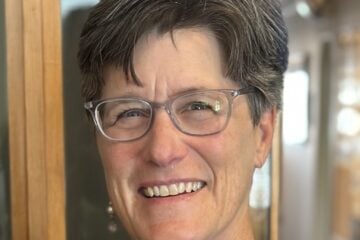WETA founder Elizabeth Campbell dies at 101

Campbell
Elizabeth Campbell, founder of WETA in Washington, D.C., and a pioneer of educational television in the U.S., died Jan. 9 [2004] in Arlington, Va., after suffering from respiratory problems.
Campbell campaigned to use television’s power for education and built WETA into one of the country’s most prominent public TV stations. She helped bring the station to the air in 1961 and served as president for a decade.
Campbell found her calling at WETA through her earlier work in education. She served as dean of the Moravian College for Women in Bethlehem, Pa., in 1928, and a year later became dean of Mary Baldwin College in Staunton, Va. There, she met her husband, Edmund. They moved to Arlington, Va., near Washington, D.C., in 1936.
In Arlington Campbell won a seat on the county’s first elected school board, the only woman in Virginia to hold such a position. She served on the board from 1947 to 1963.
School board service brought weaknesses in the county’s schools to her attention, she told Current in a 1993 interview. She thought television could help after seeing how easily her children could recall plotlines and advertised products from Howdy Doody.
“The two things that are important in education are first, information, and second, motivation,” she said. “Both of these they were getting from television.”
In 1953, Campbell joined the Greater Washington Educational Television Association, a coalition of local schools, universities and cultural institutions. She began as v.p. and later served as president.
GWETA took up the difficult task of promoting television’s educational potential to teachers and potential funders. “There was almost complete ignorance about it,” she said. Campbell lobbied the Senate for national federal aid for educational TV in 1958.
That same year, support from the Ford Foundation and the Meyer Foundation helped Campbell launch a TV series, Time for Science, in 1958. Local science teachers produced and hosted the successful program, which aired on a local commercial station before GWETA got a channel of its own. In 1961, WETA signed on from studios in a high school.
“That’s one of the highest moments of my life—to see the picture come across the river and be clear,” she told Current.
Campbell served as WETA’s president until 1971, when she stepped down to become the station’s v.p. for community affairs, a job she held until her death. She launched the station’s annual Children’s Art Festival and coordinated a lecture series. In her years at WETA, she never drew a salary.
She was born in 1902 near Winston-Salem, N.C., one of six children. She graduated from Salem College in Salem, N.C., and earned an M.A. at Columbia University.
Campbell credited her confidence and achievements to her faith in God. “I believe that things that are important and need to be done will be done,” she said. “I didn’t have time to have doubts. You don’t doubt if you’re moving.”

What Campbell had built in the capital city Johnson made into a national system.
Campbell received an Emmy in 1981 from the Board of Governors of the National Academy of Television Arts and Sciences (NATAS) and was one of 12 people to be honored by the first Silver Circle awards from a local NATAS chapter in 1987. CPB gave her its Ralph Lowell Award in 1996.
She is survived by two sons, the Rev. Benjamin Campbell of Richmond, Va., and Donald Campbell of Arlington, Va.; a daughter, Virginia Holt of Phoenix; eight grandchildren, and five great-grandchildren.







